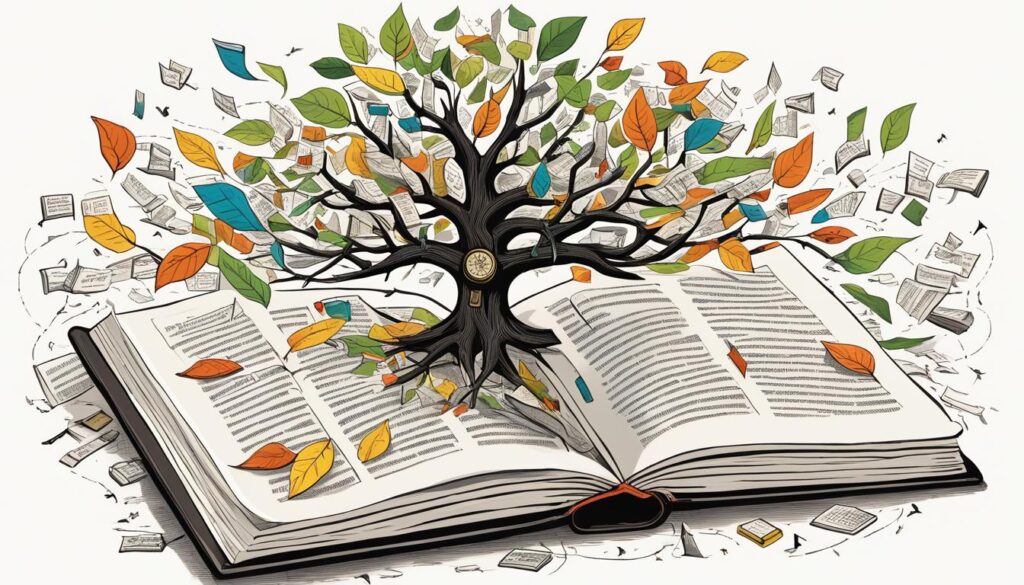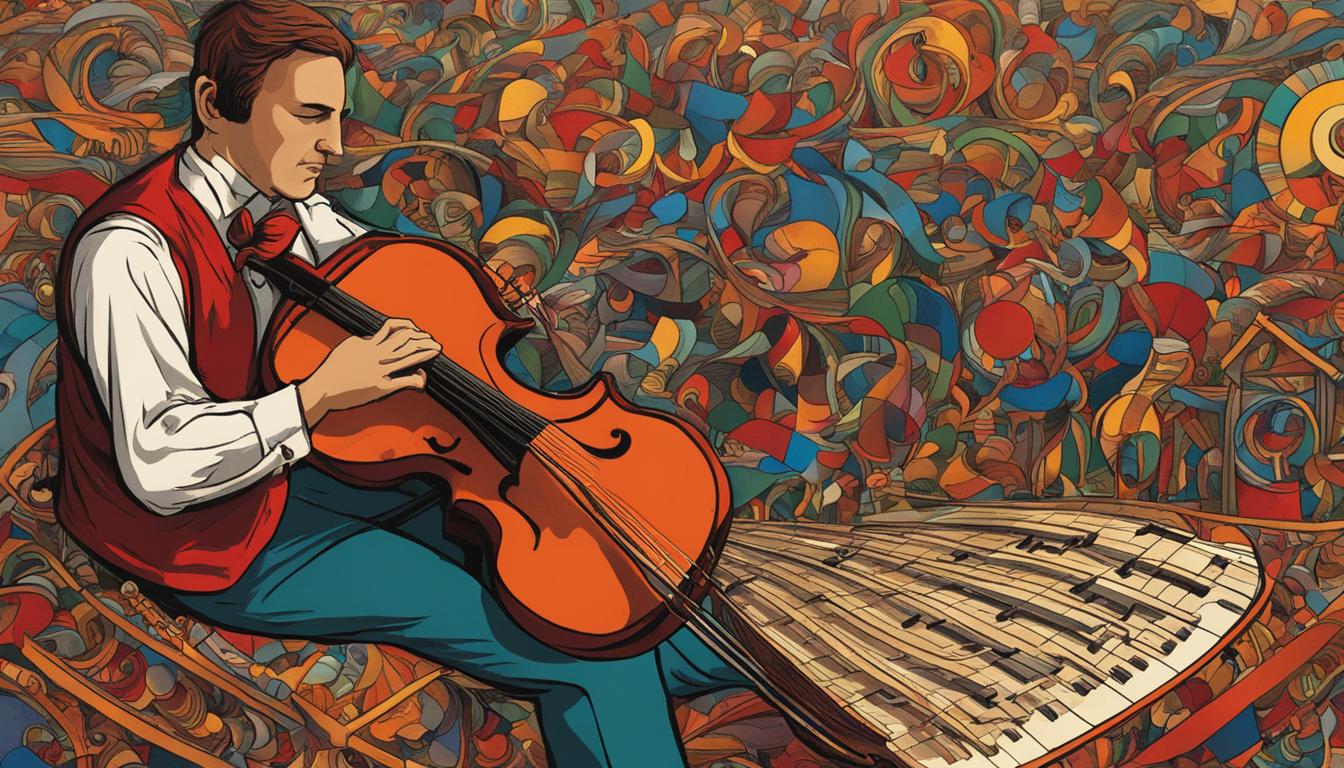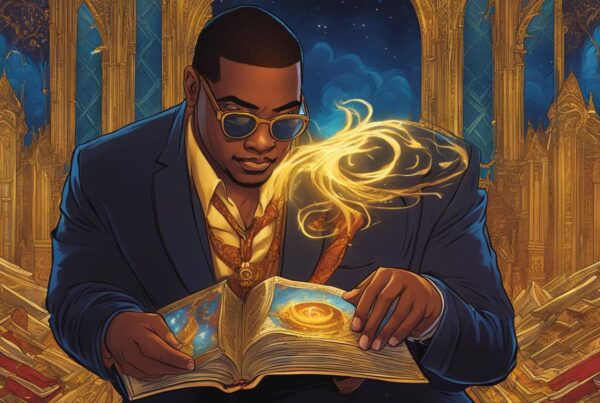If you are looking for a powerful and poignant novel that explores the impact of war, the power of music, and the enduring hope of the human spirit, then “Music of a Life” by Andreï Makine is the book for you. This moving and thought-provoking story follows the life of a talented musician who must navigate the harrowing landscape of World War II, facing impossible decisions and heart-wrenching losses along the way.
In this article, we will take an in-depth look at “Music of a Life,” exploring the author’s background, writing style, and notable works, as well as delving into the setting, plot, characters, themes, and critical reception of the book. By the end of this article, you will have a comprehensive understanding of this literary masterpiece and its enduring significance.
Key Takeaways
- “Music of a Life” is a powerful and poignant novel that explores the impact of war, the power of music, and the enduring hope of the human spirit.
- The book follows the life of a talented musician navigating the harrowing landscape of World War II, facing impossible decisions and heart-wrenching losses.
- This article provides an in-depth analysis of the book, including the author’s background, writing style, setting, plot, characters, themes, critical reception, and significance.
- “Music of a Life” is a literary masterpiece that offers a profound and timeless message of hope and resilience.
- For readers who enjoyed this book, we provide recommendations for other similar works to explore.
About the Author
Andreï Makine is a renowned French author of Russian descent, known for his poetic and evocative writing style that evokes vivid imagery and emotion in his readers. Makine was born in Siberia in 1957 and grew up in the city of Penza. He later moved to Moscow to study at the prestigious Gorky Institute of World Literature.
With a background in Russian literature, Makine’s work often explores themes of identity, memory, and nostalgia. He has published numerous novels, including “Dreams of My Russian Summers,” “The Life of an Unknown Man,” and “Requiem for the East.” His work has been translated into over 40 languages and has earned him numerous literary awards and international recognition.
Notable Works by Andreï Makine
| Title | Year Published | Awards |
|---|---|---|
| Dreams of My Russian Summers | 1995 | Prix Goncourt |
| The Life of an Unknown Man | 1999 | Grand Prix RTL-Lire |
| Requiem for the East | 2000 | Prix Médicis |
| The Woman Who Waited | 2004 | Prix Goncourt des Lycéens |
Makine’s literary work has left a significant influence on the literary world, inspiring many to delve into the complexities of the human soul. His unique blend of memoir and fiction and his ability to capture the essence of a time and a place in vivid detail have cemented his place as one of the most talented writers of his generation.
Setting and Background
The story of “Music of a Life” is set in Soviet Russia during the post-World War II era, a time of political upheaval and social transformation. Against this backdrop, the novel explores themes of war, loss, and resilience, centering around the experiences of its protagonist, a young musician named Alexei Berg.
One of the key historical events that informed the setting of the book is the Siege of Leningrad, a brutal and protracted military blockade that lasted for almost 900 days, resulting in the death of over one million people.
The city of Leningrad, renamed St. Petersburg after the collapse of the Soviet Union, serves as a symbolic presence throughout the book, evoking the city’s rich cultural heritage and its enduring spirit of artistic creativity.
In addition to exploring the impact of war on ordinary citizens and the power of music to transcend tragedy, “Music of a Life” also examines the complex political and social dynamics of Soviet society, including issues of censorship, propaganda, and state control over artistic expression.
Plot Overview
Set against the backdrop of war-torn Europe, “Music of a Life” follows the journey of a young Russian boy, Alexei Berg, who is forced to flee his homeland and start a new life in France. Alexei’s passion for music serves as a guiding light throughout his tumultuous journey, and despite the many trials he faces along the way, he remains determined to fulfill his dream of becoming a successful composer.
The story begins in Tver, Russia, where Alexei is born into a family of musicians. His father is a talented conductor, while his mother is a skilled pianist. As a child, Alexei demonstrates an innate talent for music, displaying a natural aptitude for the piano and the violin.
However, the outbreak of World War II marks a turning point for Alexei and his family. Faced with the threat of persecution and violence, they are forced to flee their homeland and embark on a perilous journey across Europe. Along the way, Alexei witnesses firsthand the horrors of war, and is forced to confront his own mortality.
Despite these challenges, Alexei never loses faith in his music, and is ultimately able to carve out a successful career as a composer in France. Along the way, he falls in love, faces betrayal, and grapples with the scars of his past.
Overall, “Music of a Life” is a moving tale of resilience, hope, and the enduring power of music.

Main Characters
Andreï Makine creates a captivating cast of characters who drive the plot of “Music of a Life.” Here’s a closer look at the main characters:
| Character | Description |
|---|---|
| Alexei Berg | The protagonist of the story, Alexei is a Russian concert pianist who travels to Paris to perform. He becomes enamored with a mysterious woman and embarks on a journey to uncover her past. |
| Anastasia | The object of Alexei’s desire, Anastasia is a beautiful and enigmatic woman who reveals little about herself. As the story progresses, Alexei attempts to unravel the mysteries of her past. |
| Maria | Maria is a fellow Russian musician living in Paris who befriends Alexei. She provides valuable insight into the city and helps Alexei in his quest. |
The relationships between these characters are complex and underpin the story’s central conflicts, namely the lingering effects of war and the transformative power of love and music.
Themes Explored
Throughout “Music of a Life,” Andreï Makine explores several central themes that resonate with readers. One of the most significant themes in the book is the impact of war on individuals and communities. Makine offers a poignant and intimate portrayal of the devastation wrought by war, highlighting the physical, emotional and psychological toll on those who experience it.
Another key theme that emerges through the book is the power of music to transcend cultural, social and linguistic boundaries. From the beguiling strains of Tchaikovsky to the haunting melodies of Shostakovich, music is a vital thread that weaves through the story, unifying the characters and giving them hope in the face of hardship.
Finally, “Music of a Life” explores the enduring hope of the human spirit. Despite the challenges and sorrows that the characters face, Makine imbues the story with a sense of resilience and optimism, underscoring the unbreakable resilience of the human spirit.
Overall, the themes in “Music of a Life” are both insightful and captivating, making it a compelling read for anyone seeking to explore the essential elements of the human condition in times of conflict or adversity.
Writing Style and Language
Andreï Makine’s writing style in “Music of a Life” is known for its poetic and evocative nature. His carefully crafted prose sets the scene and transports readers to the heart of the story. Makine often uses vivid imagery to convey the emotional depth of the characters and their experiences, creating a vivid picture for readers.
One of the most striking elements of Makine’s writing is his use of language. He masterfully weaves together French and Russian literary traditions, resulting in a unique, cross-cultural style. Makine’s writing flows seamlessly, creating a sense of fluidity and rhythm that draws readers in and keeps them engaged.
Makine’s writing is both introspective and thought-provoking. He tackles complex themes with sensitivity and insight, making his work particularly memorable and resonant. For those who appreciate elegant prose and nuanced storytelling, “Music of a Life” is a must-read.
Critical Reception
Since its publication, “Music of a Life” has garnered widespread critical acclaim and accolades from both literary experts and readers. The novel has been praised for its evocative prose, vivid descriptions, and poignant exploration of the human condition.
According to Publishers Weekly, the book is a “lyrical meditation on war, memory, and the power of music,” while Kirkus Reviews calls it a “heartbreaking elegy to a lost era, a lost love, and a lost culture.”
Renowned literary critic, Michiko Kakutani of The New York Times, described the novel as a “haunting evocation of nostalgia and loss” that “captures the power of music to transcend time and place.”
Readers have similarly lauded the book, with many citing its emotional impact and immersive storytelling. On Goodreads, “Music of a Life” has an average rating of 4.14 out of 5 stars, with readers commending the book’s lyrical prose and the depth of its characters.
Impact and Significance
“Music of a Life” by Andreï Makine has left an indelible mark on contemporary literature, exploring the complexities of the human experience with grace and insightfulness. Makine’s poignant portrayal of the impact of war, the power of music and the resilience of the human spirit has resonated with readers across the world and has firmly established the author as one of the most significant literary voices of our time.
In his depiction of the horrors of the World War II, the novel pays homage to the victims and reminds us of the importance of never forgetting the lessons of history. The novel’s exploration of the transformative power of music speaks to the deep ways in which art can heal and move us, offering hope and solace even in the darkest of times.
“Music of a Life” not only stands as a profound work of literature, but it also speaks to the universality of the human experience, transcending time and place to provoke reflection and understanding.
| Contribution to Literature | Relevance in Contemporary Society |
|---|---|
| “Music of a Life” is a testament to the power of storytelling and its ability to connect us with our shared experiences and emotions. | In our rapidly changing world, the novel’s exploration of the importance of preserving history and its lessons remains relevant and urgent. |
| Makine’s evocative prose and captivating storytelling have earned him numerous accolades, cementing him as one of modern literature’s most distinctive and influential voices. | At a time when conflict and division continue to plague our world, the novel’s message of the enduring power of hope and the human spirit feels more important than ever. |
| The novel’s themes of love, loss, and the transformative power of music have inspired countless readers and writers alike, influencing the literary landscape for generations to come. | “Music of a Life” continues to captivate and inspire readers across the globe, a testament to the novel’s enduring significance and impact. |
Similar Books and Recommendations
If you enjoyed “Music of a Life” by Andreï Makine, we recommend the following books:
| Book Title | Author | Summary |
|---|---|---|
| The Book Thief | Markus Zusak | A young girl steals books to share with others during the horrors of World War II, forming relationships and discovering the power of storytelling along the way. |
| The Cellist of Sarajevo | Steven Galloway | Set during the Bosnian War, this novel explores the lives of four individuals, including a cellist who plays in defiance of the bombing surrounding him. |
| A Constellation of Vital Phenomena | Anthony Marra | This novel tells the story of a physician tasked with caring for a young girl after her father’s disappearance during the Chechen Wars. |
These books share similar themes of war, resilience, and the power of music and storytelling. We hope they will provide you with the same level of thought-provoking and emotional storytelling as “Music of a Life.”

Conclusion
A poignant and thought-provoking work, “Music of a Life” transports readers to a world of war, music, and hope. Through the eyes of its compelling characters, the novel captures the essence of the human experience, exploring themes that resonate with contemporary audiences. Andreï Makine’s poetic and evocative writing style creates a vivid and immersive reading experience, leaving a lasting impression on readers.
With its universal themes and powerful storytelling, “Music of a Life” is a timeless work that continues to captivate and inspire readers. We encourage anyone who has not yet experienced the beauty of this novel to do so, and to explore the other works of Andreï Makine, a master of the written word.



